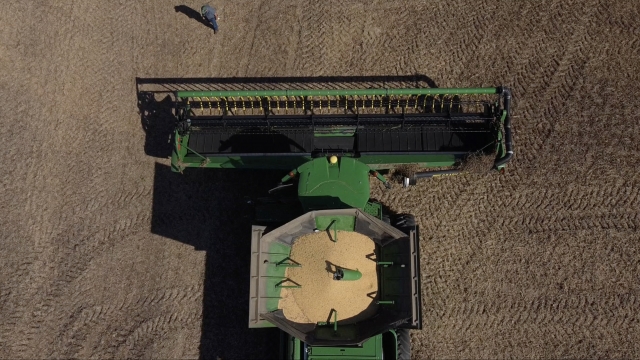Doug Darling hopped in the front seat of his Ford pickup truck and started making his way toward the 1,800 acres of land his family has farmed in Washtenaw County, Michigan, since 1833. The beginning of October marks the start of the harvest season for Darling and millions of other farmers across the country.
On a recent Tuesday afternoon, Darling and his son Dayton were in the process of harvesting soybeans.
"Things look respectable for having just an odd start," Darling said.
Out here, the 63-year-old knows the weather always runs the show. From severe rain to Canadian wildfire smoke blocking the sun, it's been a roller-coaster ride of a growing season across the country. Over the last few decades, though, Darling has learned there is one thing less predictable than Mother Nature: a Washington politician.
"Every farmer should pay attention to what happens in Washington," Darling said standing in a soybean field as Dayton drove by on the family's John Deere.
SEE MORE: The Biden administration's push to grow the next generation of farmers
At the end of last month, the farm bill expired. The piece of legislation is passed by Congress every five years and funds critical programs like crop insurance for farmers. The bill also covers funding for programs like the Supplemental Nutrition Assistance Program (SNAP), also known as food stamps.
"There is a lot of uncertainty right now," Darling added.
The $1.2 trillion price tag is part of the reason the passage of a new bill is being held up. Some Republicans also want SNAP benefits to come with stricter work requirements.
The chaos surrounding the House speaker isn't helping either, as no new legislation is currently moving forward in Congress. And no new farm bill creates more uncertainty for America's 2 million farmers, already facing a volatile marketplace.
SEE MORE: Study shows farms on decline, posing risks to future food supply
"It remains shocking the way some elected members of Congress are willing to just tear things down," said Jonathan Coppess, who teaches agriculture policy at the University of Illinois Urbana-Champaign. "Intense ideological attacks on programs and policies, the idea the federal government can't do anything, leads us down a path to nowhere."
He says with rising interest rates, high inflation and turbulence in the marketplace, a new farm bill would provide some certainty to those who grow the nation's food.
"What we're seeing in Congress is a lot of reasons for concern, and those challenges are impacting the ability to just do regular legislation like a farm bill," Coppess added.
As for farmers like Doug Darling, their main concern right now is getting crops harvested before winter sets in, ultimately hoping politicians in Washington can cut through the noise and get something accomplished.
Trending stories at Scrippsnews.com




